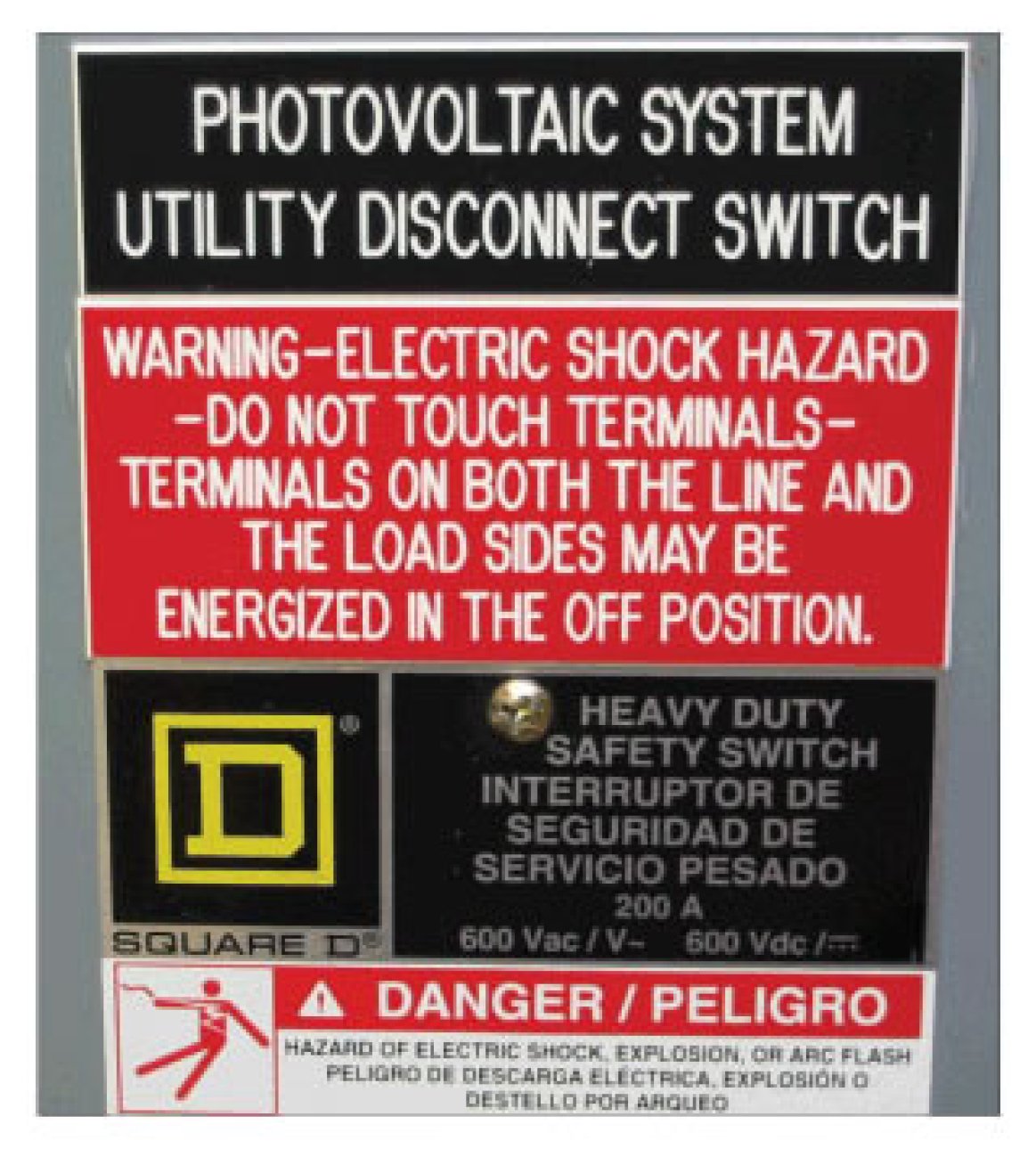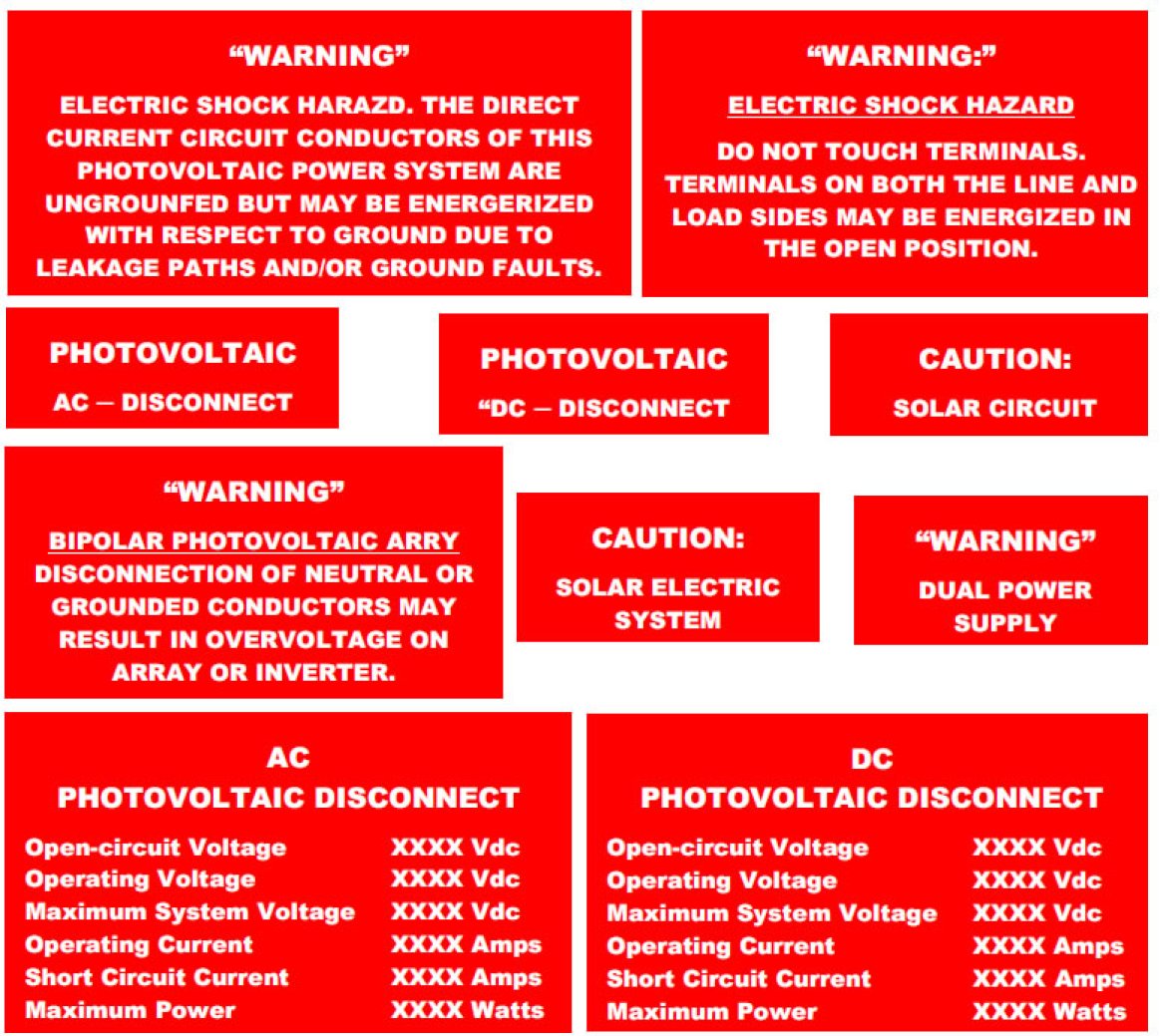

One of the most important steps of the permitting process of a photo voltaic system is the signage and labeling that identifies the existence of electrical components in the vicinity. According to NEC article 690.56, both off-grid and grid-tied systems are required to have permanent plaques or directories. There is not a nationally adapted standard on labeling, thus cities themselves, together with fire departments, have adapted their own requirements. Fortunately most cities have adopted similar requirements. Though, some may require embossed lettering or non-reversible screws to attach safety plaques. Either the installer or homeowner must contact the relevant local authorities to learn the exact requirements (usually the cities’ development department). Just to give a few examples, please have a look at the following pdfs:
City of Santa Monica, CA (pdf)
Here are the most common labels that are required by the authorities:
1) At Switches or Circuit Breakers (Pull Boxes)
WARNING — ELECTRIC SHOCK HAZARD — DO NOT TOUCH TERMINALS — TERMINALS ON BOTH THE LINE AND LOAD SIDES MAY BE ENERGIZED IN THE OPEN POSITION.
2) On the Main Service
THIS SERVICE IS FED FROM MULTIPLE SOURCES: GRID AND PV ARRAY
3) On AC Service Section and AC Sub Panels
WARNING: TURN OFF PHOTOVOLTAIC AC DISCONNECTS PRIOR TO WORKING INSIDE PANEL
4) On Back-fed Breakers
CAUTION: PHOTOVOLTAIC SYSTEM CIRCUIT BREAKER IS BACKFED
5) On AC Disconnect and AC Point of Connection
PHOTOVOLTAIC AC DISCONNECT:
MAX. AC OUTPUT OPERATING CURRENT: __________. *(1)
MAX. AC OPERATING VOLTAGE: ___________ *(2)
6) On DC Disconnect
PHOTOVOLTAIC DC DISCONNECT:
OPERATING CURRENT: ____________ *(3)
OPERATING VOLTAGE: ____________ *(4)
MAX. SYSTEM VOLTAGE: ____________ *(5)
SHORT CIRCUIT VOLTAGE: ___________ *(6)
Notes:
(1) AC Output Current: The AC output operating current or rated AC output current is the maximum current of the inverter output at full power. It can be calculated by taking the maximum power of the inverter at 104 F and dividing that value by the nominal voltage of the inverter.
(2) AC Nominal Voltage: The AC Nominal voltage or operating voltage is the nominal voltage of the inverter output. It will be same as service voltage.
(3) Operating Current: The rated current or operating current is calculated by multiplying the rated MPP current for a module string in series by the number of strings in parallel.
(4) Operating Voltage: The rated voltage or operating voltage of a string in series is calculated by multiplying the rated MPP voltage of a module by the number of modules in series.
(5) Maximum System Voltage: (NEC Article and Table 690.7, page 512) Maximum system voltage is calculated by multiplying the value of Voc (open circuit voltage) of the PV module by the appropriate value on Table 690.7 in the NEC, and then multiplying that value by the number of modules in a series string.
(6) Short Circuit Current: (NEC Article 690.8, page 513) The maximum circuit current is calculated by multiplying the rated Isc (short circuit current) of the PV module by the number of source circuits operating in parallel, then multiplying this value by 125%.
Greentech Renewables packages the most common safety labels, they are available here.
Comments
Thanks for the great article. Signage and PV System Labels are really difficult for installers as it varies by municipality and most supply houses don't want to deal with it. Do you know when you can use PV System sticker labels vs. when you need to buy engraved placards? Also do you always need to use rivets or one way screws like in Laguna?
The municipality will specify in their permitting requirements what type of signage is required. They will be able to tell you if you can use stickers or if placards are needed. They should also specify the colors, coatings and requirements for affixing the placards. Most municipalities will allow you to use adhesive to affix the placards and don't require rivets. That being said, some cities like Laguna Beach, CA require permanent faceting like rivets or one way screws.